The 2020 Mac Mini Unleashed: Putting Apple Silicon M1 To The Test
by Andrei Frumusanu on November 17, 2020 9:00 AM ESTBenchmarks: Whatever Is Available
As we’ve had very little time with the Mac mini, and the fact that this not only is a macOS system, but a new Arm64-based macOS system, our usual benchmark choices that we tend to use aren’t really available to us. We’ve made due with a assortment of available tests at the time of the launch to give us a rough idea of the performance:
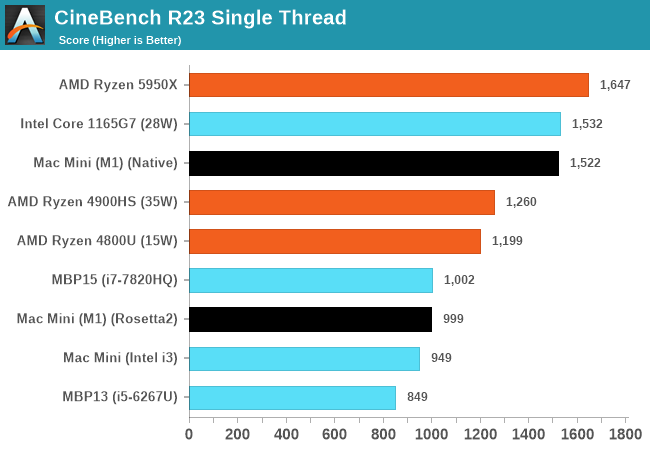
One particular benchmark that sees the first light of day on macOS as well as Apple Silicon is Cinebench. In this first-time view of the popular Cinema4D based benchmark, we see the Apple M1 toe-to-toe with the best-performing x86 CPUs on the market, vastly outperforming past Apple iterations of Intel silicon. The M1 here loses out to Zen3 and Tiger Lake CPUs, which still seem to have an advantage, although we’re not sure of the microarchitectural characteristics of the new benchmark.
What’s notable is the performance of the Rosetta2 run of the benchmark when in x86 mode, which is not only able to keep up with past Mac iterations but still also beat them.
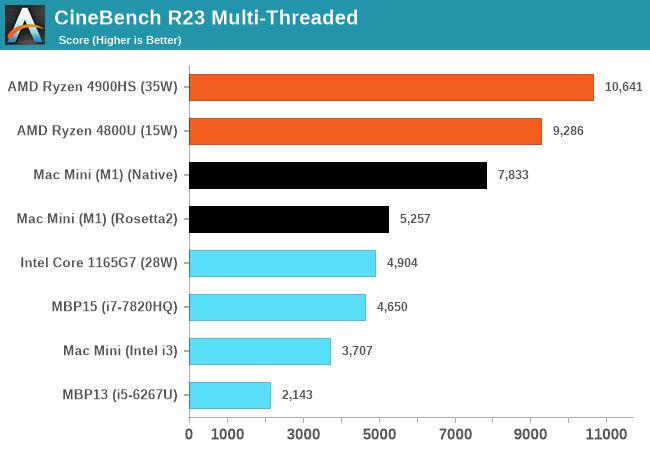
In the multi-threaded R23 runs, the M1 absolutely dominates past Macs with similar low-power CPUs. Just as of note, we’re trying to gather more data on other systems as we have access to them, and expand the graph in further updates of the article past publishing.
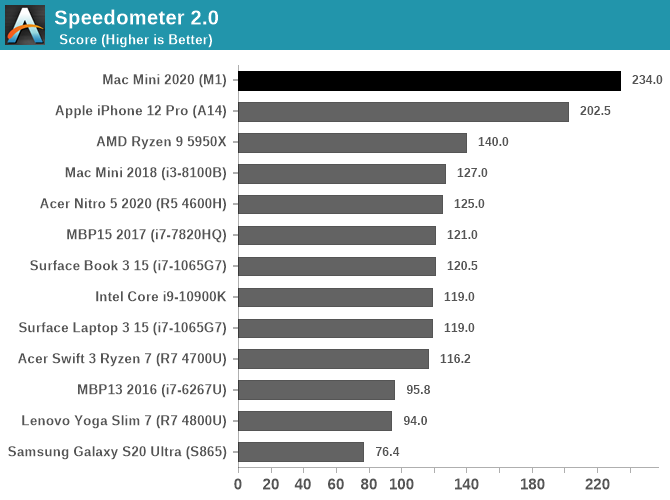
In browser-benchmarks we’ve known Apple’s CPUs to very much dominate across the landscape, but there were doubts as to whether this was due to the CPUs themselves in the iPhone or rather just the browsers and browser engines. Now running on macOS and desktop Safari, being able to compare data to other Intel Mac systems, we can come to the conclusion that the performance advantage is due to Apple’s CPU designs.
Web-browsing performance seems to be an extremely high priority for Apple’s CPU, and this makes sense as it’s the killer workload for mobile SoCs and the workload that one uses the most in everyday life.
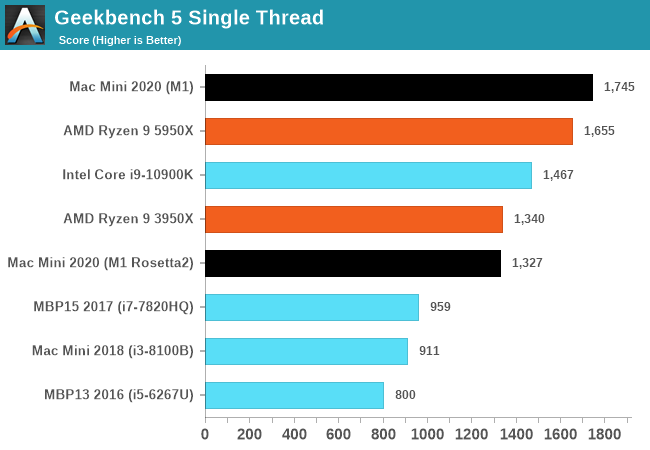
In Geekbench 5, the M1 does again extremely well as it actually takes the lead in our performance figures. Even when running in x86 compatibility mode, the M1 is able to match the top single-threaded performance of last generation’s high-end CPUs, and vastly exceed that of past iterations of the Mac mini and past Macbooks.
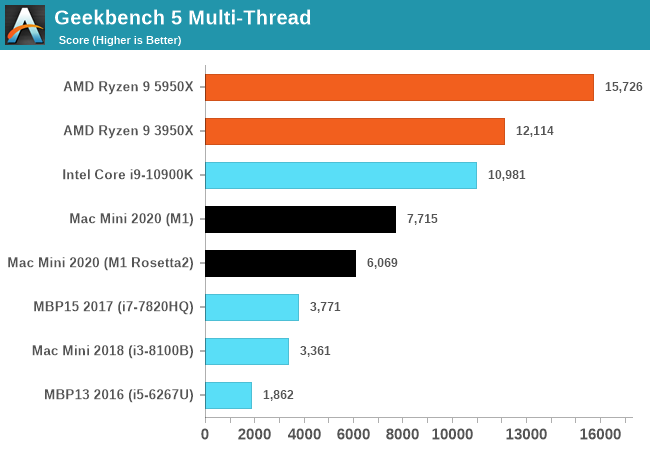
Multi-threaded performance is a matter of core-count and power efficiency of a design. The M1 here demolishes a 2017 15-inch Macbook Pro with an Intel i7-7820HQ with 4 cores and 8 threads, posting over double the score. We’ll be adding more data-points as we collect them.


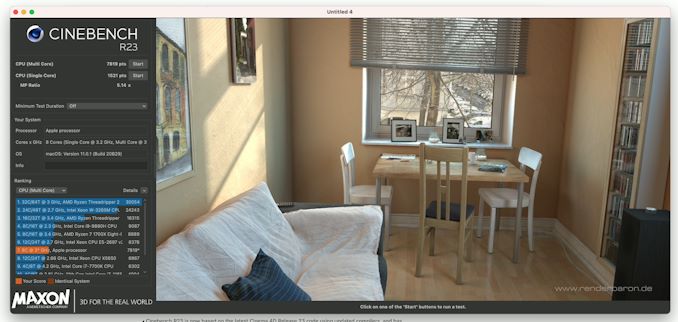








682 Comments
View All Comments
Der Keyser - Tuesday, November 17, 2020 - link
This release is going to be an interesting change in the industryKevin G - Tuesday, November 17, 2020 - link
There is also the business side of it too which is gonna be full of Game of Thones-like drama with nVidia attempting to acquire ARM. Apple and nVidia notoriously don't get along. Apple's relationship with Imagination Technologies is also strained but they've seemingly made up so that Apple can gain access to some ray tracing acceleration designs. Apple still seems to be on good terms with AMD but moving away from them as a supplier on the Mac side right now due to the ARM transition in general.YesYesNo - Tuesday, November 17, 2020 - link
Thankfully chaos is a ladder.helios24 - Tuesday, November 17, 2020 - link
Apple has an Architecture License with ARM. Basically the broadest license that ARM sells. If you didn't know this, ARM was founded as a joint venture between Apple and Acorn. Apple's license is also perpetual. That is the reason why Apple isn't interested in acquiring ARM. Apple does not use ARM designs, they use certain principles present in the ARM architecture and the ISA. Apple then makes cpus that can run ARM instruction set, that is the reason why you see big difference between apple designed SoC vs Qualcomm or ARM design.Tams80 - Tuesday, November 17, 2020 - link
Apple's not interested in buying ARM mainly because it would never be allowed to happen (without Apple splitting up), so trying to do so would be a complete waste of time.dejuknow - Tuesday, November 17, 2020 - link
Nope. Apple would still have no reason to purchase ARM even if it were allowed to happen. helios24 is completely correct. Apple has no interest in licensing technology to third parties.nevernotmaybe - Friday, November 20, 2020 - link
Apple cares about nothing other than making money, if they could have a subsidiary printing money while they continue as normal they would do it instantly. The idea they wouldn't is laughable.skingers - Monday, November 23, 2020 - link
Not laughable at all. Apple have tonnes of free cash that they could use to buy something they don't really need that makes money, but they don't do it. Instead they buy back their own stock. The other commenters here are correct, Apple already have, in perpetuity, what they need for their chip designs and they are backing themselves to be best in the business at it.helpmeoutnow - Thursday, November 26, 2020 - link
but they were never the best in the business, so how come?alysdexia - Monday, December 28, 2020 - link
die, troll http://google.com/search?q=Apple+TCO